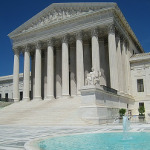 You may not have heard, above the hubbub of Tuesday’s election, about a very significant judicial decision on Brexit and issues of constitutional law that was handed down last week. But before I look at it more closely, there’s some background to the recent High Court decision that you need to know.
You may not have heard, above the hubbub of Tuesday’s election, about a very significant judicial decision on Brexit and issues of constitutional law that was handed down last week. But before I look at it more closely, there’s some background to the recent High Court decision that you need to know.
Leaving the EU
There is a mechanism set out in Article 50 of the Lisbon Treaty, whereby a member state can leave the EU. First, the state makes the decision to withdraw “in accordance with its own constitutional requirements”. It then notifies the European Council of its intention (known as “triggering Article 50”). After that, there is a two-year period for the departing state to negotiate the arrangements for withdrawal, including future relations between the state and the EU. Whether or not any such negotiations have been concluded, the departing state ceases to be an EU member at the end of that two-year period (unless all member states agree, unanimously, to extend the period).
This bit is really important: once Article 50 is triggered, there appears to be no way back; the state’s membership of the EU will end, as night follows day, and there is nothing anyone – not the EU, not the departing state, no-one – can do about it. (It has been pointed out that whether triggering Article 50 is reversible is a question of European law; but I can’t see the UK government testing the point – that would require a reference to the Court of Justice of the European Union. Politically, not a smart move.)
Of course, a state can, having left, apply to rejoin; but (a) there’s a queue; and (b) every state that joins must adopt the single currency and the borderless free movement of people (the “Schengen Agreement”). Oh, and the EU has made it crystal-clear that it will not begin to negotiate with the UK until after Article 50 is triggered. There’s no “wait and see”, or “negotiate, then decide” option.
The referendum – the law and the politics
The UK is a parliamentary, representative, democracy; laws are not made by referendum. When Parliament voted to give the British people a referendum on leaving the European Union, the legislation didn’t say what the effect of the vote would be. The vote could only have had any legal effect if the legislation had said so; so the referendum was purely advisory, nothing more.
With hindsight, it is deeply regrettable that that this was not explained to the electorate at the time. It was explained perfectly clearly to Members of Parliament before they legislated for the referendum; the (politically independent) House of Commons Library briefing paper on the Bill said this:
“This Bill requires a referendum to be held on the question of the UK’s continued membership of the EU before the end of 2017. It does not contain any requirement for the UK government to implement the results of the referendum, nor set a time limit by which a vote to leave the EU should be implemented. Instead, this is a type of referendum known as pre-legislative or consultative, which enables the electorate to voice an opinion which then influences the government in its policy decisions. …. The UK does not have constitutional provisions which would require the results of a referendum to be implemented …” (page 25)
The referendum: as history shows, 51.9% of those who voted agreed with the proposition that the UK should leave the EU; 48.1% agreed with the proposition that it should remain. (So that the irony may strike you later, I mention here that one of the main planks of the “leave” campaign was returning sovereign power to the UK Parliament.)
This was on a turn-out of 72.2%. As mathematics shows, 37.5% of the total electorate voted for change; 62.5%, therefore, did not.
Here’s the politics:
Theresa May, who was a “remainer”, has replaced David Cameron as Prime Minister – although as she achieved the post without winning any contested election, her mandate is a weak one. She is now eager to be seen to be pressing on with withdrawing the UK from the EU. She said this weekend:
“While others seek to tie our negotiating hands, the government will get on with the job of delivering the decision of the British people. It was MPs who overwhelmingly decided to put the decision in their hands. The result was clear. It was legitimate. MPs and peers who regret the referendum result need to accept what the people decided.”
(Spot the differences between this and the briefing to MPs; and between this and the referendum numbers.)
What this means is that the PM has taken the referendum result as a mandate – nay, an instruction – to trigger Article 50 by executive action, with no further input from Parliament. Indeed, the Government has been very resistant to any suggestions that it should be (in any significant way) accountable to Parliament for its negotiations post-Article 50, saying explicitly that it does not intend to give a running commentary on those negotiations. The PM’s mantra is “Brexit means Brexit” – which is about as meaningful as saying that “breakfast means breakfast”: syntactically obvious, but semantically vacuous. Merely saying it doesn’t mean that a croissant and a sausage are the same thing.
And here’s a problem. There’s no single package of arrangements, labelled “Brexit”, for the UK to simply pick up. Some favour the croissant of “soft Brexit” – a departure from the structures of the EU, but maintaining full membership of the single market in goods and services; some favour the sausage of “hard Brexit” – severing all formal links with the European single market, and prioritising control on immigration over free trade with the EU. So actually, Brexit does not necessarily mean Brexit, after all. And the Government hasn’t even begun to tell us which is its preferred aim in the negotiations to come.
So where is the role of Parliament in all this? It has been suggested that once the negotiations have been concluded, the package could then be brought to Parliament for ratification; or even be the subject of a second referendum. But this is plainly inconsistent with the structure of Article 50, as I said at the top: “negotiate, then decide” is not an option.
As a political imperative, therefore, Parliament must be engaged before, not after, Article 50 is triggered. (And as I said, it was, after all, a main plank of the leave campaign that sovereign power should be returned to Parliament.) But this was not what the Government planned; it maintained that it had the power to trigger Article 50 by executive action (in particular, the exercise of the “royal prerogative” – the ancient powers of the Crown that have not been overtaken by legislation).
It’s worth just explaining why the Government might want this to be the case. Research published the day before the referendum showed that, of those who had publicly declared a position, 24 cabinet ministers supported the remain campaign, and 6 supported leave. Of Members of Parliament, 479 supported remain, and 158 supported leave. (It’s thought that a majority of the unelected House of Lords also supported remain, although for various reasons, the upper house could not or would not stand in the way of the House of Commons. It would create a constitutional crisis that could lead to its abolition; its flooding with appointed pro-Brexit peers; or, simply its overruling by the House of Commons under the Parliament Acts. If you want more detail on this, see me after class.) The Government is, therefore, fearful that MPs might vote with their consciences and declared beliefs, and not permit Article 50 to be triggered at all; or, more likely, legislate to constrain the Government’s negotiating position, for example by requiring the Government to prioritise access to the single market over immigration control (or vice versa).
But – does the Government actually have the power to do proceed in this way? That, my friends, is a legal question, and therefore to be litigated; and litigation is what we have: an application for judicial review, brought by various campaigning individuals and groups.
The litigation – the law and the politics
The High Court heard argument over three days in October on whether the royal prerogative gave the Government the power to do what it proposed to do; or whether legislation was required. This was no ordinary sitting of the High Court; there were, unusually, three judges – the Lord Chief Justice; the Master of the Rolls (the head of civil justice); and Lord Justice Sales (who, as a barrister, had served as First Treasury Counsel – the distinguished position of the member of the Bar called on to advise and represent the Government in its most serious cases). There could not be a stronger or more heavyweight tribunal. Unusually, complete transcripts of the proceedings have been published already. Then, on Thursday of last week, judgment was handed down – the judgment is here (pdf) and a court-approved summary is here (pdf). The headline? The Government lost. Quite comprehensively.
It’s worth noting what the parties – that is, the campaigners and the Government – agreed on. First, it was agreed that this was a justiciable question. That’s worth emphasising: the Government did not argue that this was not a question for the courts (contrary to much of the hysterical press comment the followed the decision). Secondly, that the question was about process, not about the merits or demerits of Brexit (again, contrary to, etc etc). And thirdly, it was common ground that notice under Article 50 cannot be conditional (for example, on a Parliamentary or popular vote), and cannot be withdrawn once given. Finally, the sovereignty of Parliament was, I am relieved to say, not in dispute: that is, as Dicey put it in his Introduction to the Law of the Constitution, Parliament has
“… the right to make or unmake any law whatever; and, further, that no person or body is recognised by the law … as having a right to override the legislation of Parliament.”
As to the substance of the dispute, it was accepted that the making and unmaking of treaties, occurring as it does on the plane of international law, can be done by the exercise of the royal prerogative, and is not justiciable. But – and this was where the Government lost its ground – this principle goes hand-in-hand with the principle that individuals gain no rights and suffer no obligations under international law; and it is only because of that that the courts have no need to exercise any jurisdiction. The European treaties do give rights and impose obligations on individuals – but in the UK, they do not do so of their own brute force; they do so because they are allowed to by the European Communities Act 1972.
The principle that the Crown, or the Government, cannot undo what Parliament has done was set out by the courts in the Case of Proclamations of 1610; fought over bloodily in the Civil War; and enshrined in section 1 of the Bill of Rights 1688. But by initiating the departure of the UK from the EU by an exercise of the royal prerogative, this is precisely what the Government was setting out to do: triggering Article 50 would, without legislative authority, pre-empt the ability of Parliament to decide on the EU rights and obligations of individuals.
The Government’s argument – that nothing in the 1972 Act indicated that the Government did not have the power to use the prerogative in this way, was “flawed at [a] basic level”, because it gave no value to the principle that, unless Parliament legislated to the contrary, the Crown should not have the power to vary the law of the land through the exercise of prerogative powers.
The court therefore concluded that it was clear that Parliament intended to legislate by the 1972 Act so as to introduce EU law into domestic law in such a way as could not be undone by the exercise of Crown prerogative power; and the challenge succeeded.
And what of the politics?
Here is not the place to go into detail into the political and media outrage that followed the judgment. But I cannot pass by without mentioning, with appalled sadness, the vicious personal attacks on the three judges by sections of the press. This included the Daily Mail, which used the headline “Enemies of the People” – ironically, for a paper that was pro-Hitler in the 1930s, resurrecting a phrase (in German, Volksfeinde) which was used to describe Jews, Bolsheviks and other “outsiders” in pre-war Germany – including judges. Equally shocking was the complete lack of understanding of the rule of law shown by a cabinet minister, Sajid Javed, who said on television that the judgment was “… an attempt to frustrate the will of the British people and it is unacceptable.” And the Lord Chancellor, Liz Truss MP, who has a statutory duty to uphold the independence of the judiciary, allowed this barrage to continue unchecked for two days before bowing to pressure to make some kind of statement – and a pretty half-hearted, milk-and-water thing it was when it came.
What we have here is the clearest example yet, on this side of the pond, of ochlocracy – the tyranny of the majority, mob rule. It is a scary descent from reason to passion, from debate to demagoguery, from respect to disdain. You may recognise this. It will take a particularly strong kind of politician to pin their colours to principles of fundamental rights of the individual and the rule of law in the face of what is being bandied around now. Who and when that will be, or whether it will happen at all, we will have to wait and see.
What happens next? The law and the politics
As far as the legal proceedings are concerned, the case is – and always was going to be – headed straight for the Supreme Court, where it will be heard in early December. For the first time, the Supreme Court will sit in plenary session, with all 11 Justices of the Supreme Court taking part. While judgment may be delivered before Christmas, early January is perhaps more likely.
In theory, a further challenge could be taken to the Court of Justice of the European Union on the interpretation of Article 50 itself. I think it’s unlikely that the Government would take that step to find out whether triggering Article 50 is reversible; but I can see the scope for a challenge by campaigners, seeking a ruling on whether an exercise of the prerogative power following an advisory referendum is, in the terms of Article 50(1), “in accordance with [the UK’s] own constitutional requirements.”
And as for the politics?
It is commonly suggested that MPs should not try to block the passage of any Bill enabling the Article 50 trigger; and the Labour Party – the vast majority of whose MPs were in favour of remain – has indicated that it will facilitate the passage of the necessary legislation to precede Article 50. But is that the right thing for them to do? After all, MPs no more speak with one voice as to the preferred form of Brexit than the Government does.
Straying into the realm of political theory, I would like to think it’s possible we may see, for the first time in a generation or more, a proper debate on the role of a Member of Parliament. An MP, elected by a single constituency, should not aim unthinkingly to reflect the views of the population of a whole, however the great the majority. Nor, I think, should they aim unthinkingly to reflect the majority of views expressed in their own constituency. That would reduce the role of MP to that of a mere cypher or conduit – and of diffuse, incoherent and inconsistent views (and how, in any event, is an MP to properly represent a 55:45 split of views, when they only have one vote in Parliament?); and, in failing to represent those who have not expressed a view, they would be in dereliction of their duty to serve all their constituents.
I share the view of Edmund Burke, expressed in his speech to the electors of Bristol, that an MP should pay high regard to the wishes, opinions and business of his constituents; but not sacrifice to them his unbiased opinion, his mature judgement and his enlightened conscience. An MP owes his constituents, not his industry only, but his judgement; and he betrays them, instead of serving them, if he sacrifices it to their opinion. Amen to that.
Meanwhile, the PM is still saying – to the EU, to Germany, to anyone who will listen – that the Government will win the appeal, and that Article 50 will still be triggered by the end of March 2017. This date is seen as desirable, as it would mean that the two-year negotiation process would end before April 2019, when there will be further EU parliamentary elections; but it is looking increasingly unattainable. Probably so, in the unlikely event that the Government wins the appeal; definitely so, if it loses.
It is said that one way of breaking any political deadlock would be for the Government to call a snap general election, to gain a truer mandate for its political path ahead. There is one, significant, stumbling block: the Fixed Term Parliaments Act 2011. This provides for general elections only in certain circumstances: the expiry of a five-year term; a motion for an earlier election being passed by a two-thirds majority of the House of Commons; or the Government losing a no-confidence vote (which would be by a simple majority). To call an early election therefore, the Government would have to be confident of securing that two-thirds majority; and if it were not, it would have to face the calamitous option of proposing a motion of no confidence in itself, and then successfully ensuring the motion against itself is carried. What murky waters we are in.
There is, always, the option of simply repealing the Fixed Term Parliaments Act; and and indeed a Bill to achieve that has already been introduced. All this achieves, though, is opening up another front of parliamentary warfare. And all this at a time when the Government could do with as few distractions as possible from the business of actually governing.
Conclusion
The imprecation “may you live in interesting times” may not actually be an ancient Chinese curse, but in this troubled period in our history, one can understand why it could be thought to be so. What is certain is that the interesting times will continue; and I’ll report on this topic again when the Supreme Court considers the appeal.
Submitted by High Performance Counsel
Author: David Willink, Barrister, Lamb Chambers
 Leading Republicans in Congress have vowed that even if they repeal most of the Affordable Care Act early in 2017, a replacement won’t hurt those now receiving benefits, reports NPR.
Leading Republicans in Congress have vowed that even if they repeal most of the Affordable Care Act early in 2017, a replacement won’t hurt those now receiving benefits, reports NPR.



![By SPDuffy527 (Own work) [CC BY-SA 3.0 (http://creativecommons.org/licenses/by-sa/3.0)], via Wikimedia Commons](http://generalcounselnews.com/wp-content/uploads/2016/11/Raymond-Kethledge.jpg)




